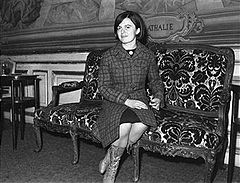- Monique Wittig
-
Monique Wittig 
Wittig in 1964Born July 13, 1935
Dannemarie, Haut-Rhin, FranceDied January 3, 2003 (aged 67)
Tucson, Arizona, United StatesOccupation author and feminist theorist Nationality French Monique Wittig (July 13, 1935 – January 3, 2003) was a French author and feminist theorist[1] who wrote about overcoming socially enforced gender roles and who coined the phrase "heterosexual contract". She published her first novel, L'Opoponax, in 1964 . Her second novel, Les Guérillères (1969), was a landmark in lesbian feminism.[citation needed]
Contents
Biography
Monique Wittig was born in 1935 in Dannemarie in Haut-Rhin, France. She was one of the founders of the Mouvement de Libération des Femmes (MLF) (Women's Liberation Movement). On August 26, 1970, accompanied by numerous other women, she put flowers under the Arc de Triomphe to honour the wife of The Unknown Soldier; this symbolic action was considered to be the founding event of French feminism.[2][3]
Wittig earned her Ph.D. from the Ecole des Hautes Etudes en Sciences Sociales,[1] after completing a thesis named "Le Chantier littéraire"[4] In 1971, she attended the Gouines rouges ("Red dykes"), the first lesbian group in Paris.[2] She was also involved in the Féministes Révolutionnaires ("Revolutionary feminists"), a radical feminist group.[2]
In 1976, she left Paris for the United States where she taught at numerous universities, including Vassar College, where she taught a course in Materialist Thought through the Program in Women's Studies, wherein her students were immersed in the process of correcting the American translation of The Lesbian Body. She was a professor in women's studies and French at the University of Arizona in Tucson, where she died of a heart attack on January 3, 2003.[1]
Theories
Monique Wittig called herself a "Radical lesbian."[5] This sensibility can be found throughout her books, where she depicted only women. To avoid any confusion, she stated:
- "There is no such thing as women literature for me, that does not exist. In literature, I do not separate women and men. One is a writer, or one is not. This is a mental space where sex is not determining. One has to have some space for freedom. Language allows this. This is about building an idea of the neutral which could escape sexuality".
A theorist of material feminism, she stigmatised the myth of "the woman", called heterosexuality a political regime, and outlined the basis for a social contract which lesbians refuse:
- "...and it would be incorrect to say that lesbians associate, make love, live with women, for 'woman' has meaning only in heterosexual systems of thought and heterosexual economic systems. Lesbians are not women." (1978)
For Wittig, the category "woman" exists only through its relation to the category "man", and "woman" without relation to "man" would cease to exist.
Wittig also developed a critical view of Marxism which obstructed the feminist struggle, but also of feminism itself which does not question the heterosexual dogma.
Through these critiques, Wittig advocated a strong universalist position, saying that the rise of the individual and the liberation of desire require the abolition of gender categories.
Bibliography
- 1964, L’Opoponax (prix Médicis)
- 1969, Les Guérillères
- 1973, Le Corps Lesbien (tr. The Lesbian Body)
- 1976, Brouillon pour un dictionnaire des amantes, (with Sande Zeig) (tr. Lesbian Peoples: Material for a Dictionary)
- 1985, Virgile, non (tr. Across the Acheron)
- 1992, The Straight Mind and Other Essays (tr. La pensée straight)
- 1999, Paris-la-Politique
- The film The Girl by Sande Zeig, Wittig's partner and collaborator, is made out of her first English novel.
See also
References
- ^ a b c Monique Wittig, 67, Feminist Writer, Dies, by Douglas Martin, January 12, 2003, New York Times
- ^ a b c Balén, Julia. In Memoriam: Monique Wittig, The Women’s Review of Books, January 2004, Vol. XXI, No. 4., quoted in Trivia Magazine, Wittig Obituary
- ^ L'Homond, Bridgitte. France.—Feminism And The Women's Liberation Movement, Women's Studies Encyclopedia, ed: Helen Tierney, quoted in Gem Women's Studies Encyclopedia
- ^ "(...)Word by Word Monique Wittig completed The Literary Workshop (Le chantier littéraire) in Gualala, California, in 1986, as her dissertation for the Diplome de l'Ecole des Hautes Etudes en Sciences Sociales in Paris. Gérard Genette was the director, and Louis Marin and Christian Metz were readers. Wittig wrote The Literary Workshop at a time of immense productivity.(...); Monique Wittig, Catherine Temerson, Sande Zeig. "The Literary Workshop: An Excerpt", in "GLQ: A Journal of Lesbian and Gay Studies – Volume 13, Number 4, 2007, pp. 543–551
- ^ Kirkup, James (2003-01-09). "Monique Wittig". The Independent. http://news.independent.co.uk/people/obituaries/article123410.ece. Retrieved 2007-06-08.
External links
Categories:- 1935 births
- 2003 deaths
- Cardiovascular disease deaths in Arizona
- Deaths from myocardial infarction
- Feminist studies scholars
- Feminist writers
- French feminists
- French emigrants to the United States
- French women writers
- Lesbian writers
- LGBT feminists
- LGBT rights activists from France
- LGBT writers from France
- People from Haut-Rhin
- Philosophy of sexuality
- Queer theorists
- Women philosophers
- Prix Médicis winners
Wikimedia Foundation. 2010.
